
22.4K
Downloads
62
Episodes
2015 Chicago Marathon. Mile 13. I’m flying—feeling like I could run forever. Heart surgery, back surgery, barely able to stand a decade before, and here I am crushing it. Then I see the sign: NOT ALMOST THERE. Everything changed. Heavy legs. Cramping. Mental breakdown. I barely finished what started as my best race ever. That sign broke me, but it also built me. Southside Chicago kid who studied for 15 seconds between building cars on the assembly line. Graduated in 5 years. Built companies. Sold two. 800 employees. Young father at 20 who figured it out as I went. I’ve spent 50+ episodes of Not Almost There interviewing experts, and now my cohost and I are diving deeper into the conversations that matter most. We dig into what it really takes—in business, branding, health, life. No fluff. Real talk about building something that matters while the clock’s ticking. Whether you’re running your first mile or your hundredth company, we’re here to help you go the distance. Because almost there isn’t good enough.
Episodes

7 hours ago
7 hours ago
You've got the idea. You've done the research. So why are you still waiting? Multi-exit founder breaks down the psychology that keeps most people stuck in the "someday" phase - and the exact questions he asks himself before taking the leap.
From validating passion over market size to why your first-year budget is probably wrong, this episode tackles the gap between wanting to start and actually starting. Plus: the brutal reality of letting go early employees, why fighting business problems makes them worse, and how to know when you're ready to risk it all.

Saturday Jul 05, 2025
Doing this one thing can save you millions in taxes
Saturday Jul 05, 2025
Saturday Jul 05, 2025
The Crucial Role of Attorneys in Startups: Lessons from a Seasoned Entrepreneur
In this episode, Joe reflects on his entrepreneurial journey, emphasizing the importance of hiring specialized legal counsel when starting a business. He discusses his experiences with different types of business structures and the significant financial benefits he achieved through proper legal advice, such as qualifying for QSBS (Qualified Small Business Stock) by structuring his software company as a C corporation. Joe advises new entrepreneurs to consult industry-specific attorneys to lay a strong foundation for their business and shares insights on effectively forming and maintaining legal relationships.
00:00 Introduction: Lessons from Starting a Company
00:16 The Importance of Hiring the Right Attorney
00:42 Choosing the Right Business Structure
00:58 Benefits of a C Corporation
02:11 The Role of Attorneys in Business Growth
02:23 Specialized Attorneys for Different Needs
02:45 Utilizing Attorneys as a Resource
03:31 The Value of Legal Advice in Partnerships
04:05 Finding the Right Attorney for Your Business
Go hire an Attorney

Sunday Jun 29, 2025
Go Find Your Way
Sunday Jun 29, 2025
Sunday Jun 29, 2025
Where does ambition really come from? Joe and his cohost dive deep into the messy reality behind entrepreneurial success—from studying 15 seconds at a time on the assembly line to scaling Go Brewing while implementing new systems with a lean team.
They explore why 'work-life balance' is BS for entrepreneurs, how spite can fuel success, and why the path that looks clean from the outside is actually dirty and chaotic behind the scenes.
Plus: why becoming obsessed beats building habits, and the liberating realization that no one actually cares about your journey as much as you think they do. Real talk about finding your own way in business and life.
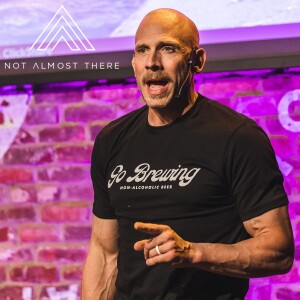
Tuesday Nov 22, 2022
Creating the Iron Cowboy with World Record Holder James Lawrence
Tuesday Nov 22, 2022
Tuesday Nov 22, 2022
James Lawrence, "The Iron Cowboy," and Joe sit down to discuss many topics, including a part of his story that isn't well known, Ironman training, mental toughness, and so much more.
More info at
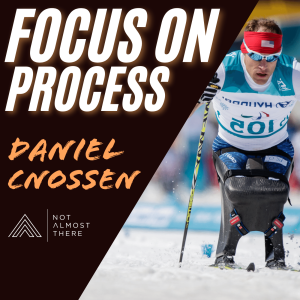
Monday Aug 08, 2022
Focus On The Process with Daniel Cnossen, Navy Seal and Olympian
Monday Aug 08, 2022
Monday Aug 08, 2022
Dan Cnossen is a Navy Seal, Paralympic gold Medalist, and leadership guru. Dan became a Navy Seal in 2003. Over the next six years, Dan was deployed multiple times to Iraq and Afghanistan and rose in rank to become the officer-in-charge of an 18-man SEAL platoon. In 2009, Dan was deployed to Afghanistan, into an area of heavy combat. There, on a night mission in the mountains, he stepped on an IED, losing both legs in the blast. He would later be awarded a Purple Heart and Bronze Star with Valor. As part of his rehab, he was introduced to the sports of cross-country skiing and biathlon. Never one to shy from a challenge, he eventually earned a spot on the 2014 U.S. Paralympic Team. At the 2018 Paralympic Games Dan stole the show, remarkably winning one gold, four silver and one bronze medal over a period of eight days earning the honor of Best Male Athlete of The Games.
IN THIS EPISODE…Dan Cnossen shares his incredibly heroic story of enduring the unthinkable while serving as a Navy Seal; stepping on a pressure plate that forever changed his life. He shares with Joe how he was able to take this seemingly insurmountable set back and pushed himself to train and become an Paralympic gold medalist as well as a public speaker and leadership guru.
🔍 Breakdown with Dan Cnossen:
Chapter 1 (0:00): Introduction
Chapter 2 (1:53) Joining the seal team
Chapter 3 (10:35) Learning leadership ideals from seals
Chapter 4 (16:27) The BUDS experience
Chapter 5 (24:55) Mental tools used to get through BUDS
Chapter 6 (30:39) First years as a seal
Chapter 7 (36:37) What Afghanistan was like
Chapter 8 (41:18) The explosion
Chapter 9 (49:45) The hard road of recovery
Chapter 10 (57:27) Finding a future in sports
Chapter 11 (70:10) Mindset through challenges
Chapter 12 (77:24) Closing Remarks
📞 Connect with Dan Cnossen
→https://www.linkedin.com/in/dan-cnossen-75b9181ab
→https://dancnossen.com
→https://www.teamusa.org/usparanordicskiing/athletes/Dan-Cnossen
👊 To learn more about Not Almost There by visiting this link
→ Not Almost There http://notalmostthere.com
Connect with Joe on social here:
→https://www.instagram.com/notalmostthere
→Facebook https://www.facebook.com/notalmostthere
→Twitter http://twitter.com/joechura
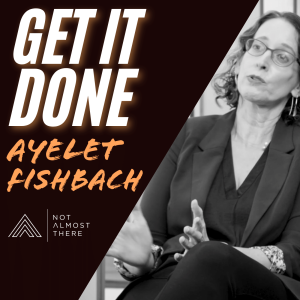
Wednesday Apr 27, 2022
Wednesday Apr 27, 2022
Ayelet Fishbach PhD, is the Professor of Behavioral Science and Marketing at the University of Chicago Booth School of Business, and the past president of the Society for the Study of Motivation and the International Social Cognition Network (ISCON). She is an expert on motivation and decision making and the author of Get it Done: Surprising Lessons from the Science of Motivation. Ayelet’s groundbreaking research on human motivation has won her several international awards, including the Society of Experimental Social Psychology’s Best Dissertation Award and Career Trajectory Award, and the Fulbright Educational Foundation Award.
IN THIS EPISODE…Joe discusses with Ayelet, who has dedicated her life to the science behind motivation and most recently published a book they get into today, how to best set yourself up for success in your personal goal setting. In this conversation, you will understand how to set goals you will stick with, focus on success in the middle of the journey of your goals, as the beginning and end tend to be blissful, and of course, significant strategy and tips you can start using today.
🔍 Breakdown with Ayelet Fishbach:
Chapter 1 (0:00): Introduction
Chapter 2 (3:11) Creating an environment for goals
Chapter 3 (10:10) Understanding how to craft goals
Chapter 4 (18:17) Empathy gap
Chapter 5 (23:32) Do and don’t goals
Chapter 6 (31:38) Intrinsic motivation
Chapter 7 (40:25) Recapping identifying goals
Chapter 8 (49:13) Instant gratification
Chapter 9 (54:47) Planning for future success
Chapter 10 (63:55) Closing Remarks
Material Referenced in this interview:
→Get It Done by Ayelet Fishback
→https://www.ayeletfishbach.com
📞 Connect with Ayelet Fishbach
→https://www.instagram.com/ayeletfishbach
→https://www.facebook.com/ayeletfishbach.getitdone
→https://twitter.com/ayeletfishbach
→https://www.linkedin.com/in/ayelet-fishbach-b32a8b4
👊 To learn more about Not Almost There by visiting this link
→ Not Almost There http://notalmostthere.com
Connect with Joe on social here:
→https://www.instagram.com/notalmostthere
→Facebook https://www.facebook.com/notalmostthere
→Twitter http://twitter.com/joechura

Friday Mar 11, 2022
Find A Way with Amy Purdy three-time World Cup para-snowboard gold medalist
Friday Mar 11, 2022
Friday Mar 11, 2022
Amy Purdy is the top-ranked female adaptive snowboarder in the U.S., a three-time World Cup para-snowboard gold medalist, the 2014 Paralympic bronze medalist, and the founder of Adaptive Action Sports, a nonprofit organization that helps youth, young adults, and wounded veterans with physical disabilities get involved with action sports. She is a professional motivational speaker who has been featured at both TEDx and Pop Tech and is also an actress, model, dancer, clothing designer, and experienced product spokesperson. Amy was the breakout star and a finalist on season 18 of Dancing with the Stars.
IN THIS EPISODE…Amy shares with Joe her story. She found herself in a seemingly insurmountable life situation at age 19, Amy contracted a virus that lead to the amputation of both of her legs. Not only does she share her feelings and the timeline of events of this life-changing moment, but most importantly, she shares how she was not only able to overcome the obstacles in her way, but dominate every goal she set for herself.
🔍 Breakdown with Amy Purdy:
Chapter 1 (0:00): Introduction
Joe introduces Amy and sets up the episode.
Chapter 2 (2:06) Recapping her story
Amy contracted meningitis at the age of 19 and in a 48 hour time frame she found herself fighting for her life.
Chapter 3 (10:10) Premonition from an unlikely source
While Amy shares a lot of her story, today she shared a story she hadn’t before. She was given a premonition from a massage therapist.
Chapter 4 (20:56) Spirituality intertwined with this life-changing event
Anyone would find themselves in depression or having feelings of inability to move on, but not Amy.
Chapter 5 (24:15) Coming to terms with amputation
Amy didn’t lose her legs immediately when she was admitted to the hospital, and she shares how she received the news.
Chapter 6 (31:51) Snowboarding
Snowboarding was always something Amy had a passion for and was not going to allow her amputation or a lack of equipment to stand in her way.
Chapter 7 (37:32) The power of being present
Amy’s mother demonstrated to Amy the power of positive thought and being present. Amy’s mother wouldn’t allow anyone with negative thoughts around her daughter.
Chapter 8 (46:02) Dancing with the stars
This was not an easy experience, but a very rewarding one. Once again Amy found herself in a situation where she had to get creative and engineer this opportunity.
Chapter 9 (59:34) What’s next
Amy embodies the “not almost there” mindset, and isn’t done yet. She is still setting goals and plans to crush them in 2022.
Chapter 10 (63:55) Closing Remarks
Joe wraps up the episode and shares his final thoughts
Material Referenced in this interview:
→On My Own Two Feet by Amy Purdy
→https://amypurdy.com
📞 Connect with Amy Purdy
→https://www.instagram.com/amypurdygurl
→https://www.facebook.com/AmyPurdyGurl
→https://twitter.com/AmyPurdyGurl
→https://www.linkedin.com/in/amy-purdy-3055a343
👊 To learn more about Not Almost There by visiting this link
→ Not Almost There http://notalmostthere.com
Connect with Joe on social here:
→https://www.instagram.com/notalmostthere
→Facebook https://www.facebook.com/notalmostthere
→Twitter http://twitter.com/joechura

Friday Feb 18, 2022
Building Good Habits with Wendy Wood
Friday Feb 18, 2022
Friday Feb 18, 2022
Dr. Wendy Wood is a best-selling author and Provost Professor of Psychology and Business at the University of Southern California. Given her research over the past 30 years, she is widely considered the world's scientific expert on habit formation and change. She has published over 100 articles, and her research has been supported by Proctor & Gamble, National Science Foundation, the Templeton Foundation, and the Radcliffe Institute. She is the author of Good Habits, Bad Habits. Her work has been featured in The New York Times, NPR, Washington Post, on radio shows like Freakanomics, and in podcasts like the People’s Pharmacy. A 2008 Radcliffe Institute Fellow, and 2018 Distinguished Chair of Behavioral Science at the Sorbonne/INSEAD in Paris, Wood has advised the World Bank, the Centers for Disease Control, and industries such as Proctor & Gamble and Lever Bros. In 2018, she gave the inaugural address in Paris for the Sorbonne-INSEAD Distinguished Chair in Behavioral Science.
IN THIS EPISODE…Wendy and Joe talk about her research and ideas in her book, Good Habits, Bad Habits: The Science of Making Positive Changes That Stick. Wendy Wood describes the “what the hell” effect when it comes to dieting and so many more case studies she shares with us. The best part of today’s episode is you will take away so many actionable tips you can start using today.
🔍 Breakdown with Wendy Wood:
Chapter 1 (0:00): Introduction
Joe introduces Wendy and sets up the episode.
Chapter 2 (2:54) Relationship with resolutons
New Year's resolutions have a tendency to fail and Wendy explains to Joe why and the science behind it.
Chapter 3 (5:09) Making new habits stick
You need to create habits that are not just occasional practices, but ones that will become second nature.
Chapter 4 (9:23) Instant gratification
We are a society of instant gratification and instant results. Habits take time to form and that is important to understand.
Chapter 5 (15:30) Time for a habit to stick
There are many conflicting anecdotal thoughts on how long it takes a habit to stick, however, Wendy has significant research to answer this question.
Chapter 6 (26:08) Eliminate friction
When creating a new habit, one of the most important aspects is to remove friction. Understanding your environment and removing obstacles is best.
Chapter 7 (34:47) Consistency and bad habits
You need to stick with it. Consistency will help you with your new good habits but can also keep you stuck in bad habits.
Chapter 8 (42:29) Vietnam study
There is an incredible study around drug use and soldiers from Vietnam. The research shows the importance of the environment.
Chapter 9 (46:56) Influences around us
Social media can be a major influence and habit in our lives. It can be so important to make sure we are putting up boundaries.
Chapter 10 (50:11) Closing Remarks
Joe wraps up the episode and shares his final thoughts
Material Referenced in this interview:
→Good Habits Bad Habits by Wendy Wood
→https://goodhabitsbadhabits.com
📞 Connect with Wendy Wood
→https://www.instagram.com/profwendywood
→https://www.facebook.com/GoodHabitsBadHabits
→https://www.linkedin.com/in/wendy-wood-15180a15
→https://twitter.com/ProfWendyWood
👊 To learn more about Not Almost There by visiting this link
→ Not Almost There http://notalmostthere.com
Connect with Joe on social here:
→https://www.instagram.com/notalmostthere
→Facebook https://www.facebook.com/notalmostthere
→Twitter http://twitter.com/joechura
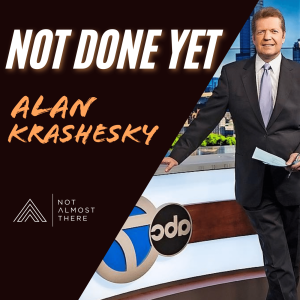
Tuesday Feb 01, 2022
Not Done Yet with Emmy Award Winner Alan Krashesky
Tuesday Feb 01, 2022
Tuesday Feb 01, 2022
Alan Krashesky is an Emmy award-winning broadcast journalist. As ABC 7's primary news anchor, he currently co-anchors three of ABC 7's top-rated weekday newscasts at 5 p.m., 6 p.m., and 10 p.m. Among Chicago's most trusted news anchors, Krashesky is well-known and respected for both his news anchoring and news reporting. Every newscast he has anchored has consistently been rated No. 1 in the Chicago market. He joined ABC 7 as a general assignment reporter in 1982. Krashesky's reporting in Chicago and abroad has earned high praise. He has earned numerous Chicago Midwest Emmy Awards and a Chicago Headline Club Peter Lisagor Award. He is considered one of the top reporters in the market to cover major domestic and international stories. He gained his first broadcasting experience in college when he was a news anchor on WICB-FM radio in Ithaca, New York. In addition to his career accomplishments, Krashesky has a long and outstanding history of volunteering his personal time for community service. He serves as a mentor for students interested in broadcast journalism and is a local spokesperson for Alzheimer's disease. He is also a member of the Chicago Midwest Chapter of the National Academy of Television Arts and Sciences and the Society of Professional Journalists. Krashesky was born in Philadelphia, Pennsylvania, but attended the Milton Hershey School in Hershey, Pennsylvania, a residential school for children with financial and social needs.
IN THIS EPISODE…Joe and Alan talk about his impressive career, Alan has been a news anchor for almost 40 years. While the news, its content, and digging into the idea of truth in media is a part of the conversation, Alan’s personal story is also incredibly important. Alan talks about his upbringing and how a horrible tragedy led to a life path, while may seem unorthodox, ultimately gave him the stability he needed to become the successful person he is today. Alan advocates for forward progress over perfection. Goals are important, but things can happen along the way that can take you down a different path.
🔍 Breakdown with Alan Krashesky:
Chapter 1 (0:00): Introduction
Joe introduces Alan and sets up the episode.
Chapter 2 (2:00) Alan’s early life
Alan’s father was taken from him too soon. His mother could not handle taking care of her children alone, so Alan was sent to an all boys school
Chapter 3 (22:29) Letter to his wife
While a young man, Alan met his now wife at a time where there was no social media and they corresponded with hand written letters.
Chapter 4 (24:36) Decisions pave the way
You often cannot connect the dots by looking forward, only by looking back. You may not know why an event is happening in your life until it has passed you.
Chapter 5 (33:55) Crime and media coverage
Alan was a victim of a terrible crime and therefore is able to bring his empathy and compassion to the stories he tells.
Chapter 6 (60:12) How to process live information
Being on air and gettinig information live can be stressful, but Alan explains how he is able to manage and recover from any mistakes.
Chapter 7 (65:41) Leadership and finding the we vs me
You are only as good as the team around you. Make sure you are finding the right people to surround yourself with.
Chapter 8 (65:41) Finding truth in the news
The most important point to keep in mind, is your source of truth. Also you need to keep in mind affiliations surrounding your media.
Chapter 9 (70:52) Critics of the world
Developing thick skin is important and to learn the importance of not giving attention to negativity.
Chapter 10 (77:59) Closing Remarks
Joe wraps up the episode and shares his final thoughts
Material Referenced in this interview:
→Channel 7 News
→https://www.mhskids.org/
📞 Connect with Alan Krashesky
→https://www.instagram.com/alan_krashesky
→https://www.facebook.com/krashesky
→https://www.linkedin.com/in/alan-krashesky-4714368
→https://twitter.com/KrasheskyABC7
👊 To learn more about Not Almost There by visiting this link
→ Not Almost There http://notalmostthere.com
Connect with Joe on social here:
→https://www.instagram.com/notalmostthere
→Facebook https://www.facebook.com/notalmostthere
→Twitter http://twitter.com/joechura
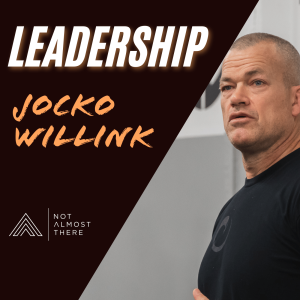
Sunday Jan 16, 2022
Leadership with Jocko Willink, Navy Seal Commander, Author and Entrepreneur
Sunday Jan 16, 2022
Sunday Jan 16, 2022
Jocko Willink is a retired U.S. Navy SEAL officer, co-author of the #1 New York Times bestseller Extreme Ownership, Dichotomy of Leadership, host of the top-rated Jocko Podcast, and co-founder of Echelon Front, where he serves as Chief Executive Officer, leadership instructor, speaker, and strategic advisor. Jocko spent 20 years in the SEAL Teams, starting as an enlisted SEAL and rising through the ranks to become a SEAL officer. Jocko returned from Iraq to serve as Officer-in-Charge of training for all West Coast SEAL Teams. There, he spearheaded the development of leadership training and personally instructed and mentored the next generation of SEAL leaders who have continued to perform with great success on the battlefield. Jocko is the recipient of the Silver Star, the Bronze Star, and numerous other personal and unit awards. Upon retiring from the Navy, Jocko co-founded Echelon Front, a premier leadership consulting company, where he teaches the leadership principles he learned on the battlefield to help others lead and win. Jocko also authored the Discipline Equals Freedom Field Manual, a New York Times Bestseller.
IN THIS EPISODE… Jocko and Joe talk about the origin of Jocko’s propensity for leadership. Jocko also talks about his time in the Navy Seals and how serving our country was a natural calling for him. He shares stories and insights he has learned from being in the Navy Seals for 20 years, and as an entrepreneur, including a story about how Jocko handles dealing with someone coming at you heated - his insight was spot on.
🔍 Breakdown with Jocko Willink:
Chapter 1 (0:00): Introduction
Joe introduces Jocko and sets up the episode.
Chapter 2 (2:00) Serving in the military
Serving for over 20 years is something that Jocko views as an honor. He felt he was always called to serve and was happy to do so.
Chapter 3 (8:12) Becoming an officer
Once Jocko became a leader within the seals, he shares his experience on how he was able to fill that role.
Chapter 4 (14:47) Leadership in business
Once Jocko was ending his career in the military he began a consultative career in leadership through the experience he gained while serving.
Chapter 5 (25:39) Themes from corporations
Even though you may imagine the corporate world to be different from the military, there are actually more similarities.
Chapter 6 (32:40) Finding Jiu-Jitsu
Jiu-Jitsu was a profound experience for Jocko. It was a practice that combined all the practices and lessons he had learned throughout his life.
Chapter 7 (42:47) Importance of breathing
Jocko didn’t have a major epiphany surrounding breathing, but he finds that not allowing panic to set in during a situation is what helps keep control.
Chapter 8 (49:08) Prioritize your day
Organizing your day is running an efficient team. Use the four laws of combat, cover, move, prioritize, decentralize command.
Chapter 9 (54:38) New products
Prioritize time for everything. Jocko needs to plan time to come up with new ideas and then allows his team to run with the plan.
Chapter 10 (58:33) Closing Remarks
Joe wraps up the episode and shares his final thoughts
Material Referenced in this interview:
→About Face by David H. Hackworth
→Breath by Rickson Gracie
→Extreme Ownership by Jocko Willink and Leif Babin
📞 Connect with Jocko Willink
→https://www.instagram.com/jockowillink/?hl=en
→https://www.facebook.com/jkowillink
→https://www.linkedin.com/in/jocko-willink-260b289
→https://echelonfront.com
👊 To learn more about Not Almost There by visiting this link
→ Not Almost There http://notalmostthere.com
Connect with Joe on social here:
→https://www.instagram.com/notalmostthere
→Facebook https://www.facebook.com/notalmostthere
→Twitter http://twitter.com/joechura
